Leadership for Managers: Ratan Tata's Leadership Approach Analysis
VerifiedAdded on 2022/08/26
|10
|2117
|22
Report
AI Summary
This report delves into the leadership process of Ratan Tata, examining his application of democratic and transformational leadership theories within the Tata Group. It explores the importance of leadership qualities for managers, highlighting how Tata's visionary approach, decision-making abilities, and risk-taking influence organizational growth. The report outlines the processes of applied leadership, emphasizing the significance of teamwork and the development of leadership skills, such as discipline, situational awareness, and conflict resolution. It references various leadership theories and their impact on business success, emphasizing the role of leadership in motivating employees and achieving organizational objectives. The report concludes by summarizing the key concepts and skills associated with effective leadership in a business context.
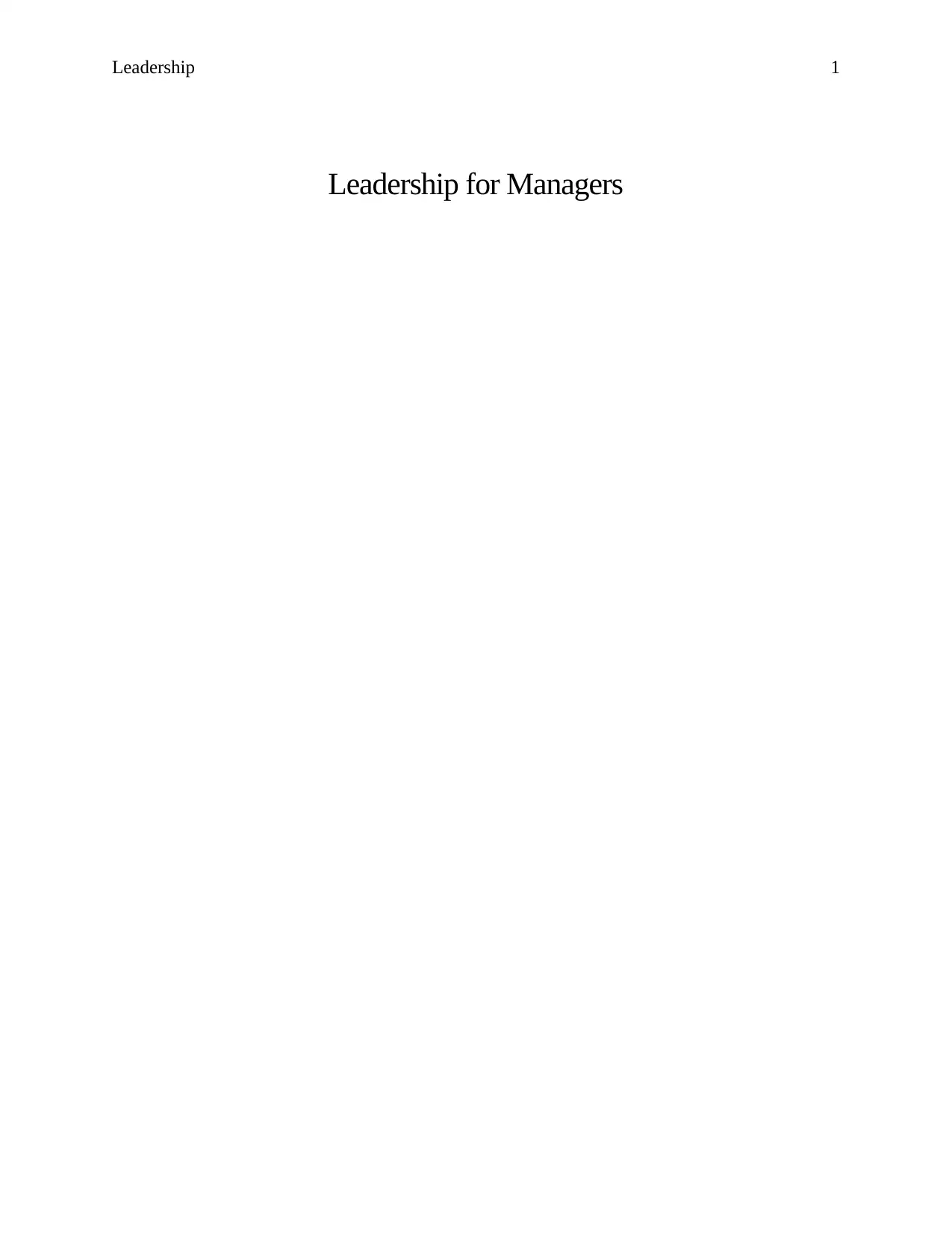
Leadership 1
Leadership for Managers
Leadership for Managers
Paraphrase This Document
Need a fresh take? Get an instant paraphrase of this document with our AI Paraphraser
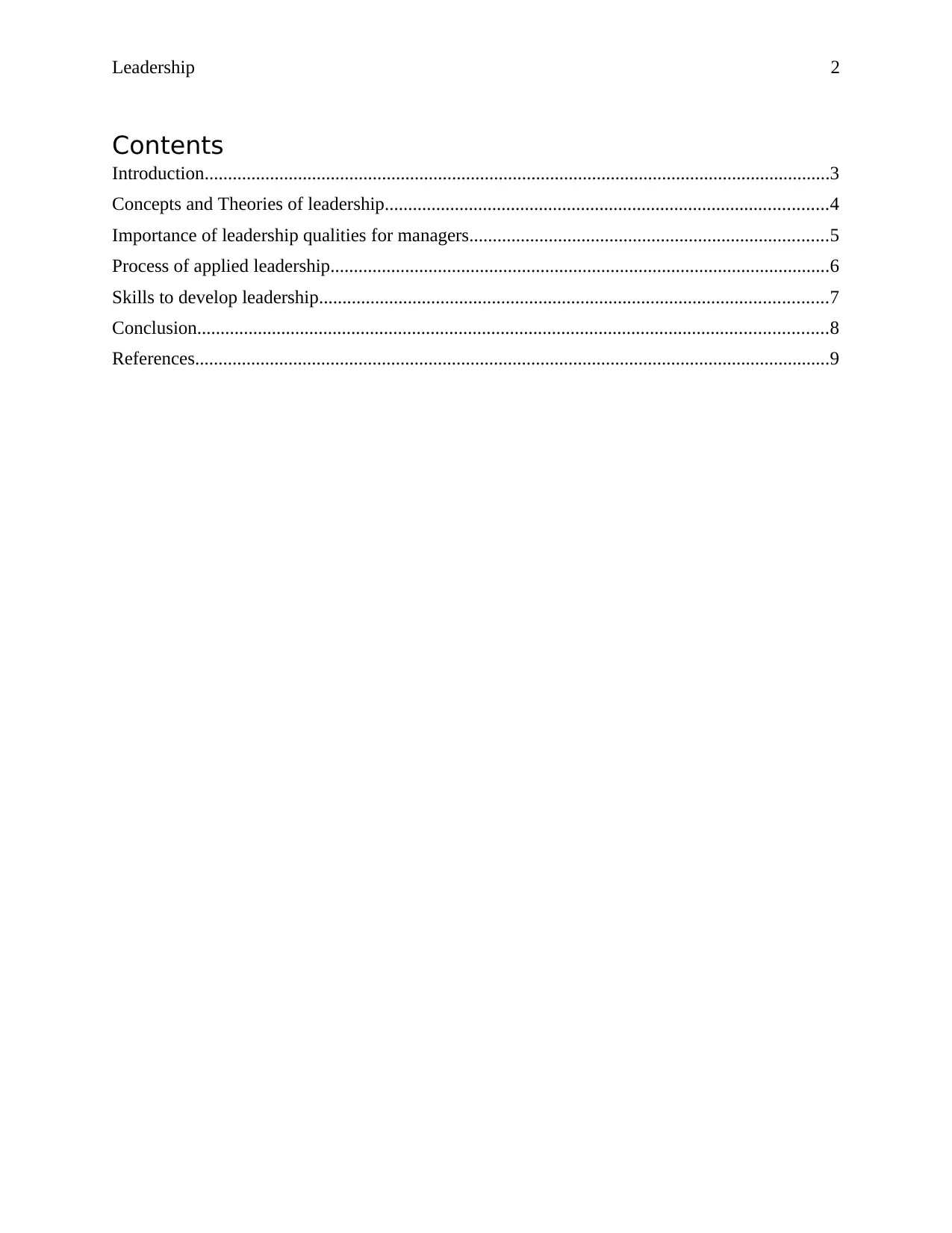
Leadership 2
Contents
Introduction......................................................................................................................................3
Concepts and Theories of leadership...............................................................................................4
Importance of leadership qualities for managers.............................................................................5
Process of applied leadership...........................................................................................................6
Skills to develop leadership.............................................................................................................7
Conclusion.......................................................................................................................................8
References........................................................................................................................................9
Contents
Introduction......................................................................................................................................3
Concepts and Theories of leadership...............................................................................................4
Importance of leadership qualities for managers.............................................................................5
Process of applied leadership...........................................................................................................6
Skills to develop leadership.............................................................................................................7
Conclusion.......................................................................................................................................8
References........................................................................................................................................9
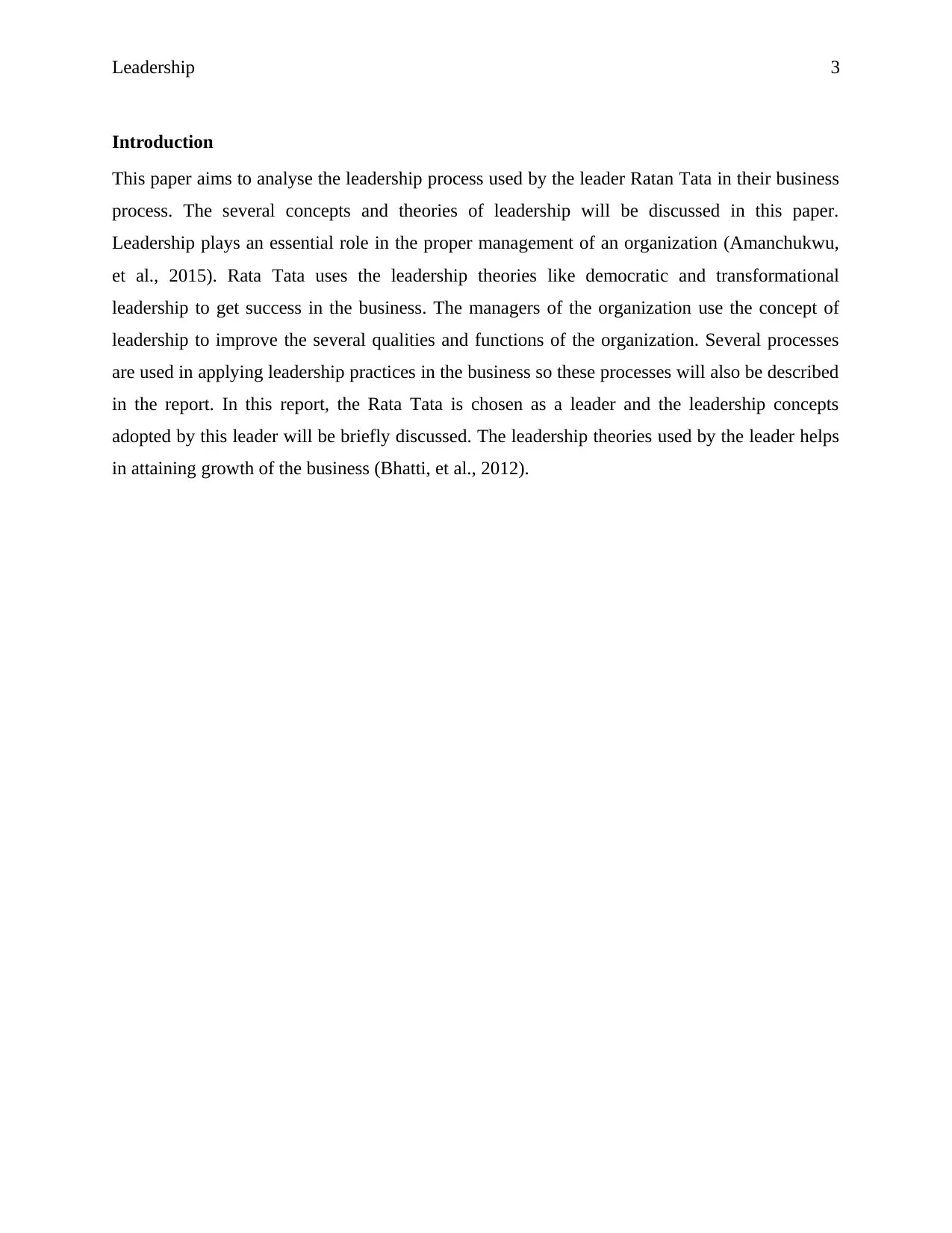
Leadership 3
Introduction
This paper aims to analyse the leadership process used by the leader Ratan Tata in their business
process. The several concepts and theories of leadership will be discussed in this paper.
Leadership plays an essential role in the proper management of an organization (Amanchukwu,
et al., 2015). Rata Tata uses the leadership theories like democratic and transformational
leadership to get success in the business. The managers of the organization use the concept of
leadership to improve the several qualities and functions of the organization. Several processes
are used in applying leadership practices in the business so these processes will also be described
in the report. In this report, the Rata Tata is chosen as a leader and the leadership concepts
adopted by this leader will be briefly discussed. The leadership theories used by the leader helps
in attaining growth of the business (Bhatti, et al., 2012).
Introduction
This paper aims to analyse the leadership process used by the leader Ratan Tata in their business
process. The several concepts and theories of leadership will be discussed in this paper.
Leadership plays an essential role in the proper management of an organization (Amanchukwu,
et al., 2015). Rata Tata uses the leadership theories like democratic and transformational
leadership to get success in the business. The managers of the organization use the concept of
leadership to improve the several qualities and functions of the organization. Several processes
are used in applying leadership practices in the business so these processes will also be described
in the report. In this report, the Rata Tata is chosen as a leader and the leadership concepts
adopted by this leader will be briefly discussed. The leadership theories used by the leader helps
in attaining growth of the business (Bhatti, et al., 2012).
⊘ This is a preview!⊘
Do you want full access?
Subscribe today to unlock all pages.

Trusted by 1+ million students worldwide
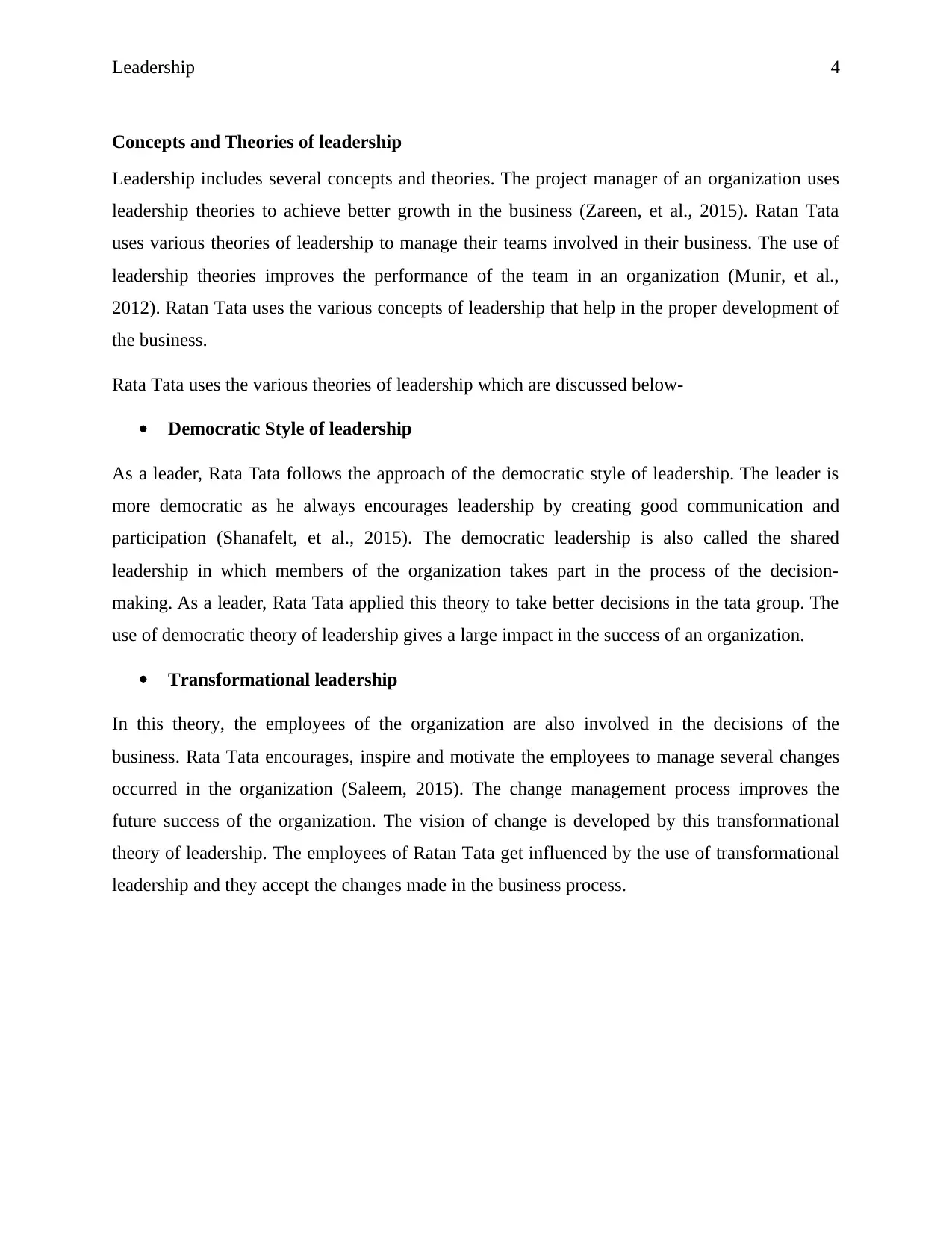
Leadership 4
Concepts and Theories of leadership
Leadership includes several concepts and theories. The project manager of an organization uses
leadership theories to achieve better growth in the business (Zareen, et al., 2015). Ratan Tata
uses various theories of leadership to manage their teams involved in their business. The use of
leadership theories improves the performance of the team in an organization (Munir, et al.,
2012). Ratan Tata uses the various concepts of leadership that help in the proper development of
the business.
Rata Tata uses the various theories of leadership which are discussed below-
Democratic Style of leadership
As a leader, Rata Tata follows the approach of the democratic style of leadership. The leader is
more democratic as he always encourages leadership by creating good communication and
participation (Shanafelt, et al., 2015). The democratic leadership is also called the shared
leadership in which members of the organization takes part in the process of the decision-
making. As a leader, Rata Tata applied this theory to take better decisions in the tata group. The
use of democratic theory of leadership gives a large impact in the success of an organization.
Transformational leadership
In this theory, the employees of the organization are also involved in the decisions of the
business. Rata Tata encourages, inspire and motivate the employees to manage several changes
occurred in the organization (Saleem, 2015). The change management process improves the
future success of the organization. The vision of change is developed by this transformational
theory of leadership. The employees of Ratan Tata get influenced by the use of transformational
leadership and they accept the changes made in the business process.
Concepts and Theories of leadership
Leadership includes several concepts and theories. The project manager of an organization uses
leadership theories to achieve better growth in the business (Zareen, et al., 2015). Ratan Tata
uses various theories of leadership to manage their teams involved in their business. The use of
leadership theories improves the performance of the team in an organization (Munir, et al.,
2012). Ratan Tata uses the various concepts of leadership that help in the proper development of
the business.
Rata Tata uses the various theories of leadership which are discussed below-
Democratic Style of leadership
As a leader, Rata Tata follows the approach of the democratic style of leadership. The leader is
more democratic as he always encourages leadership by creating good communication and
participation (Shanafelt, et al., 2015). The democratic leadership is also called the shared
leadership in which members of the organization takes part in the process of the decision-
making. As a leader, Rata Tata applied this theory to take better decisions in the tata group. The
use of democratic theory of leadership gives a large impact in the success of an organization.
Transformational leadership
In this theory, the employees of the organization are also involved in the decisions of the
business. Rata Tata encourages, inspire and motivate the employees to manage several changes
occurred in the organization (Saleem, 2015). The change management process improves the
future success of the organization. The vision of change is developed by this transformational
theory of leadership. The employees of Ratan Tata get influenced by the use of transformational
leadership and they accept the changes made in the business process.
Paraphrase This Document
Need a fresh take? Get an instant paraphrase of this document with our AI Paraphraser
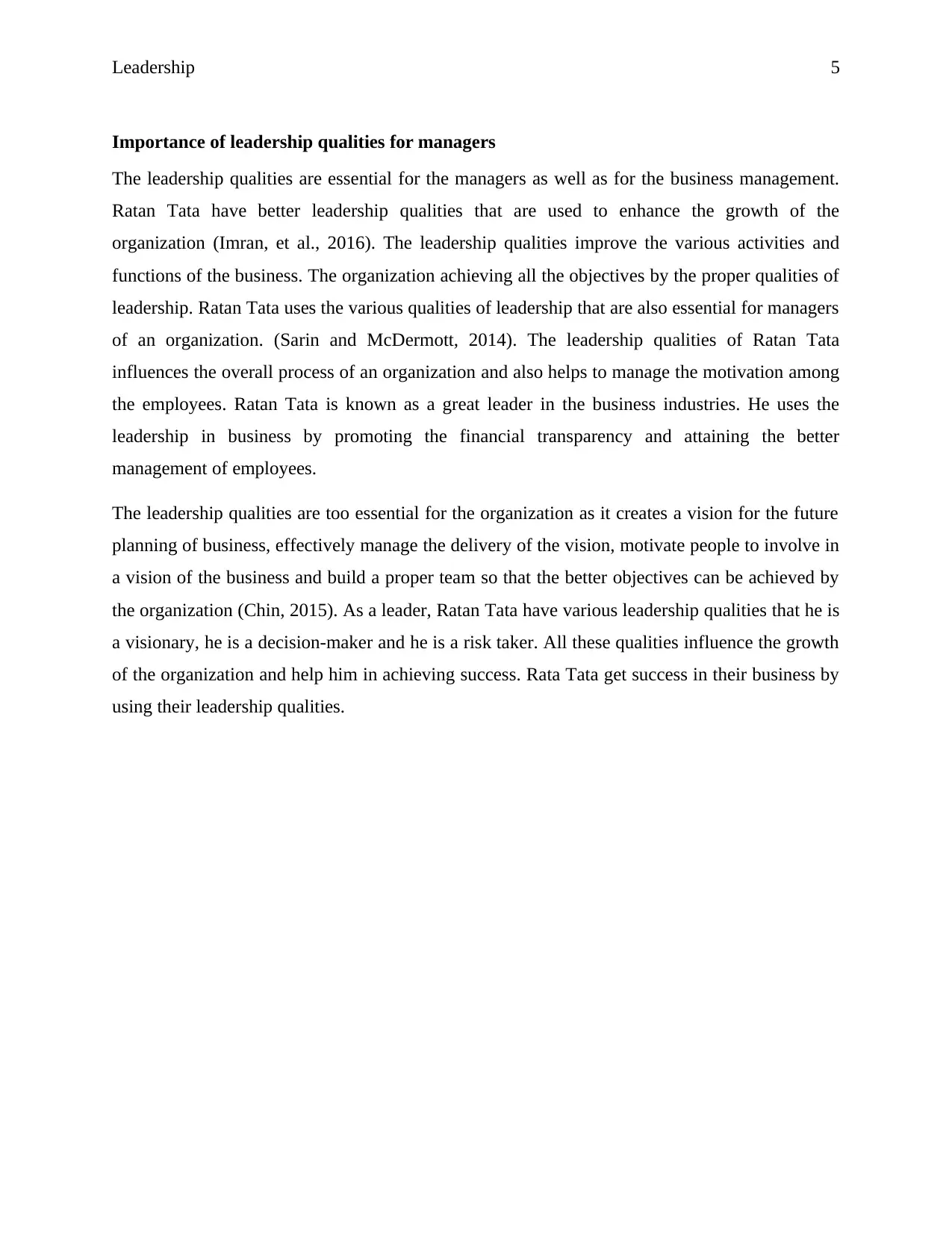
Leadership 5
Importance of leadership qualities for managers
The leadership qualities are essential for the managers as well as for the business management.
Ratan Tata have better leadership qualities that are used to enhance the growth of the
organization (Imran, et al., 2016). The leadership qualities improve the various activities and
functions of the business. The organization achieving all the objectives by the proper qualities of
leadership. Ratan Tata uses the various qualities of leadership that are also essential for managers
of an organization. (Sarin and McDermott, 2014). The leadership qualities of Ratan Tata
influences the overall process of an organization and also helps to manage the motivation among
the employees. Ratan Tata is known as a great leader in the business industries. He uses the
leadership in business by promoting the financial transparency and attaining the better
management of employees.
The leadership qualities are too essential for the organization as it creates a vision for the future
planning of business, effectively manage the delivery of the vision, motivate people to involve in
a vision of the business and build a proper team so that the better objectives can be achieved by
the organization (Chin, 2015). As a leader, Ratan Tata have various leadership qualities that he is
a visionary, he is a decision-maker and he is a risk taker. All these qualities influence the growth
of the organization and help him in achieving success. Rata Tata get success in their business by
using their leadership qualities.
Importance of leadership qualities for managers
The leadership qualities are essential for the managers as well as for the business management.
Ratan Tata have better leadership qualities that are used to enhance the growth of the
organization (Imran, et al., 2016). The leadership qualities improve the various activities and
functions of the business. The organization achieving all the objectives by the proper qualities of
leadership. Ratan Tata uses the various qualities of leadership that are also essential for managers
of an organization. (Sarin and McDermott, 2014). The leadership qualities of Ratan Tata
influences the overall process of an organization and also helps to manage the motivation among
the employees. Ratan Tata is known as a great leader in the business industries. He uses the
leadership in business by promoting the financial transparency and attaining the better
management of employees.
The leadership qualities are too essential for the organization as it creates a vision for the future
planning of business, effectively manage the delivery of the vision, motivate people to involve in
a vision of the business and build a proper team so that the better objectives can be achieved by
the organization (Chin, 2015). As a leader, Ratan Tata have various leadership qualities that he is
a visionary, he is a decision-maker and he is a risk taker. All these qualities influence the growth
of the organization and help him in achieving success. Rata Tata get success in their business by
using their leadership qualities.
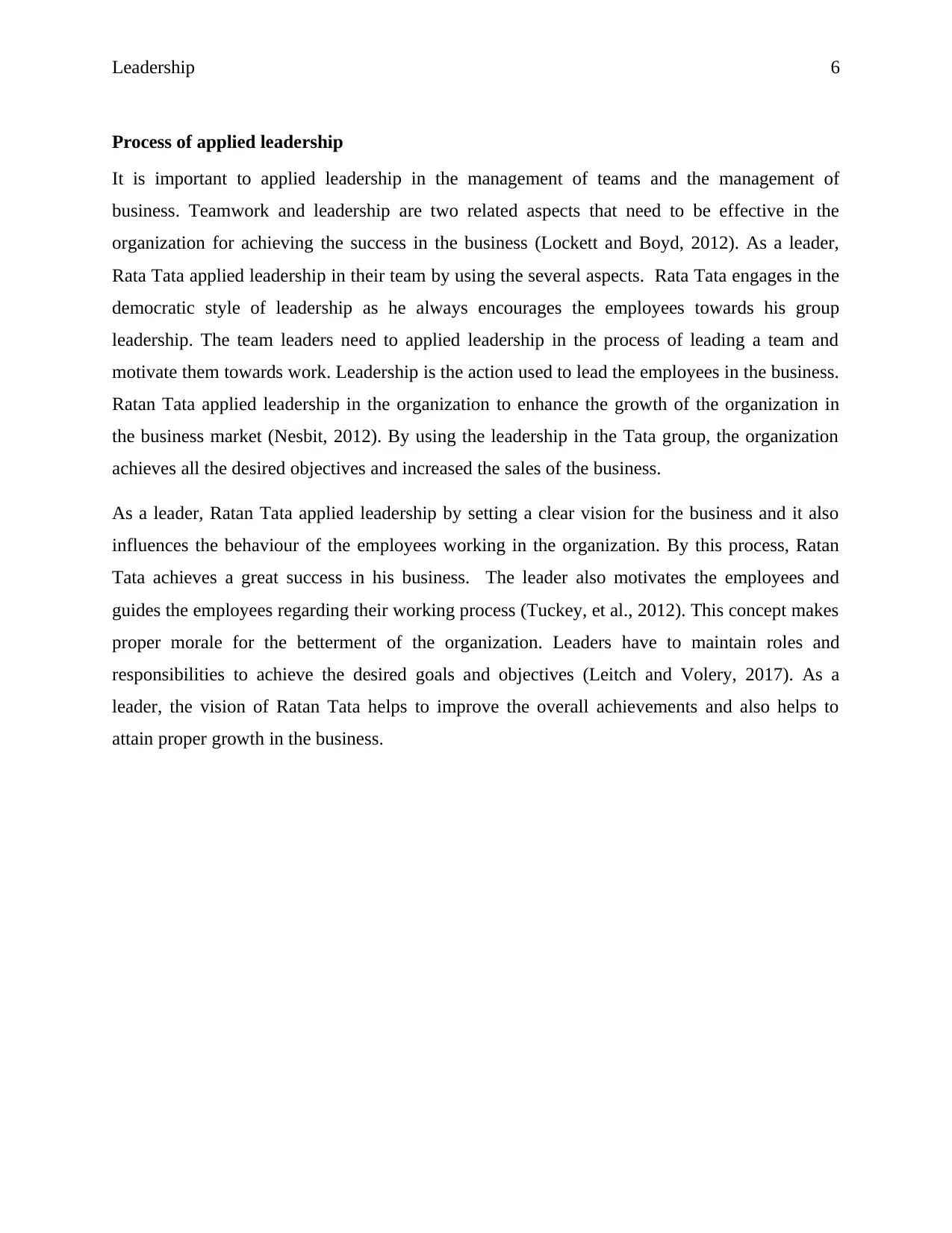
Leadership 6
Process of applied leadership
It is important to applied leadership in the management of teams and the management of
business. Teamwork and leadership are two related aspects that need to be effective in the
organization for achieving the success in the business (Lockett and Boyd, 2012). As a leader,
Rata Tata applied leadership in their team by using the several aspects. Rata Tata engages in the
democratic style of leadership as he always encourages the employees towards his group
leadership. The team leaders need to applied leadership in the process of leading a team and
motivate them towards work. Leadership is the action used to lead the employees in the business.
Ratan Tata applied leadership in the organization to enhance the growth of the organization in
the business market (Nesbit, 2012). By using the leadership in the Tata group, the organization
achieves all the desired objectives and increased the sales of the business.
As a leader, Ratan Tata applied leadership by setting a clear vision for the business and it also
influences the behaviour of the employees working in the organization. By this process, Ratan
Tata achieves a great success in his business. The leader also motivates the employees and
guides the employees regarding their working process (Tuckey, et al., 2012). This concept makes
proper morale for the betterment of the organization. Leaders have to maintain roles and
responsibilities to achieve the desired goals and objectives (Leitch and Volery, 2017). As a
leader, the vision of Ratan Tata helps to improve the overall achievements and also helps to
attain proper growth in the business.
Process of applied leadership
It is important to applied leadership in the management of teams and the management of
business. Teamwork and leadership are two related aspects that need to be effective in the
organization for achieving the success in the business (Lockett and Boyd, 2012). As a leader,
Rata Tata applied leadership in their team by using the several aspects. Rata Tata engages in the
democratic style of leadership as he always encourages the employees towards his group
leadership. The team leaders need to applied leadership in the process of leading a team and
motivate them towards work. Leadership is the action used to lead the employees in the business.
Ratan Tata applied leadership in the organization to enhance the growth of the organization in
the business market (Nesbit, 2012). By using the leadership in the Tata group, the organization
achieves all the desired objectives and increased the sales of the business.
As a leader, Ratan Tata applied leadership by setting a clear vision for the business and it also
influences the behaviour of the employees working in the organization. By this process, Ratan
Tata achieves a great success in his business. The leader also motivates the employees and
guides the employees regarding their working process (Tuckey, et al., 2012). This concept makes
proper morale for the betterment of the organization. Leaders have to maintain roles and
responsibilities to achieve the desired goals and objectives (Leitch and Volery, 2017). As a
leader, the vision of Ratan Tata helps to improve the overall achievements and also helps to
attain proper growth in the business.
⊘ This is a preview!⊘
Do you want full access?
Subscribe today to unlock all pages.

Trusted by 1+ million students worldwide
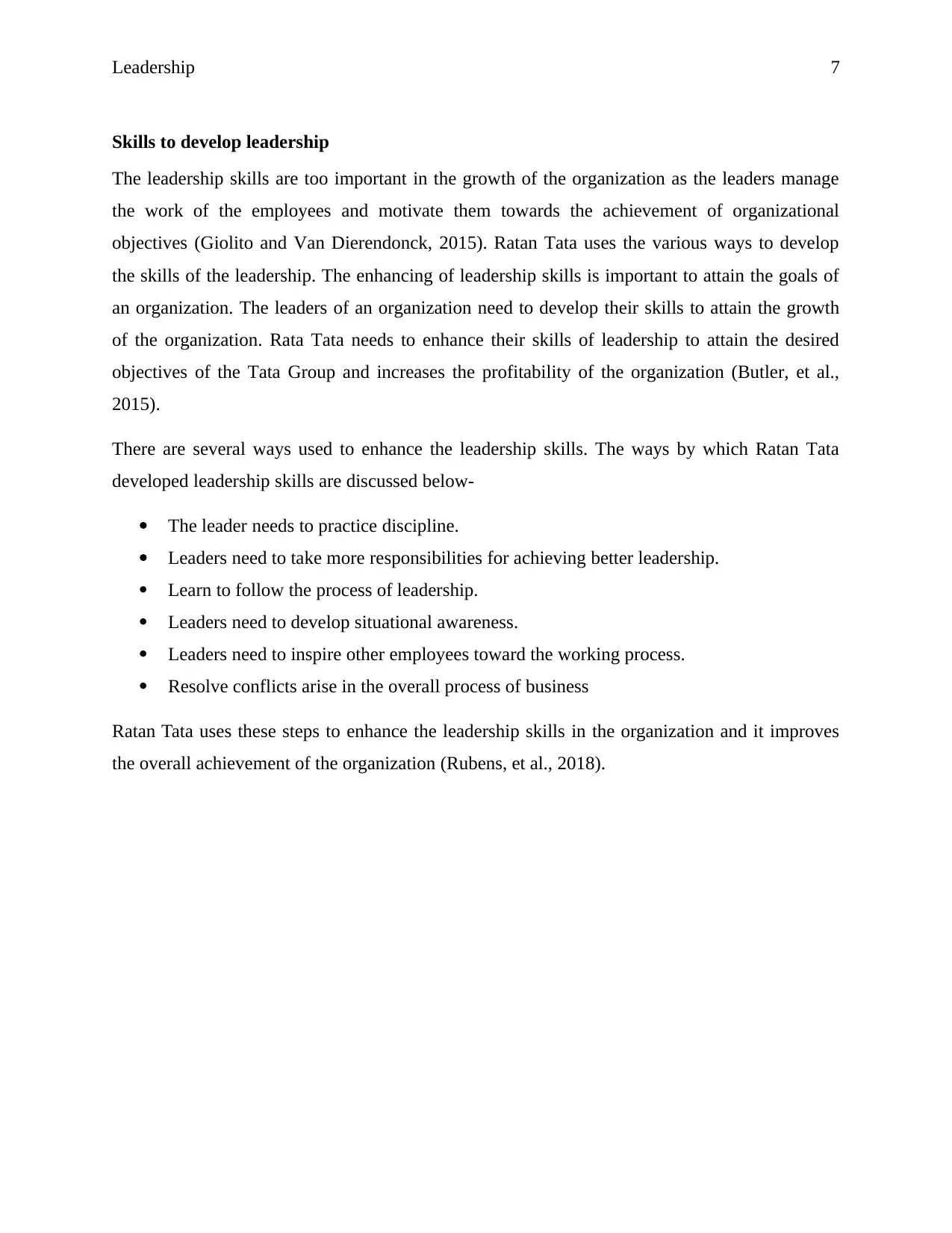
Leadership 7
Skills to develop leadership
The leadership skills are too important in the growth of the organization as the leaders manage
the work of the employees and motivate them towards the achievement of organizational
objectives (Giolito and Van Dierendonck, 2015). Ratan Tata uses the various ways to develop
the skills of the leadership. The enhancing of leadership skills is important to attain the goals of
an organization. The leaders of an organization need to develop their skills to attain the growth
of the organization. Rata Tata needs to enhance their skills of leadership to attain the desired
objectives of the Tata Group and increases the profitability of the organization (Butler, et al.,
2015).
There are several ways used to enhance the leadership skills. The ways by which Ratan Tata
developed leadership skills are discussed below-
The leader needs to practice discipline.
Leaders need to take more responsibilities for achieving better leadership.
Learn to follow the process of leadership.
Leaders need to develop situational awareness.
Leaders need to inspire other employees toward the working process.
Resolve conflicts arise in the overall process of business
Ratan Tata uses these steps to enhance the leadership skills in the organization and it improves
the overall achievement of the organization (Rubens, et al., 2018).
Skills to develop leadership
The leadership skills are too important in the growth of the organization as the leaders manage
the work of the employees and motivate them towards the achievement of organizational
objectives (Giolito and Van Dierendonck, 2015). Ratan Tata uses the various ways to develop
the skills of the leadership. The enhancing of leadership skills is important to attain the goals of
an organization. The leaders of an organization need to develop their skills to attain the growth
of the organization. Rata Tata needs to enhance their skills of leadership to attain the desired
objectives of the Tata Group and increases the profitability of the organization (Butler, et al.,
2015).
There are several ways used to enhance the leadership skills. The ways by which Ratan Tata
developed leadership skills are discussed below-
The leader needs to practice discipline.
Leaders need to take more responsibilities for achieving better leadership.
Learn to follow the process of leadership.
Leaders need to develop situational awareness.
Leaders need to inspire other employees toward the working process.
Resolve conflicts arise in the overall process of business
Ratan Tata uses these steps to enhance the leadership skills in the organization and it improves
the overall achievement of the organization (Rubens, et al., 2018).
Paraphrase This Document
Need a fresh take? Get an instant paraphrase of this document with our AI Paraphraser
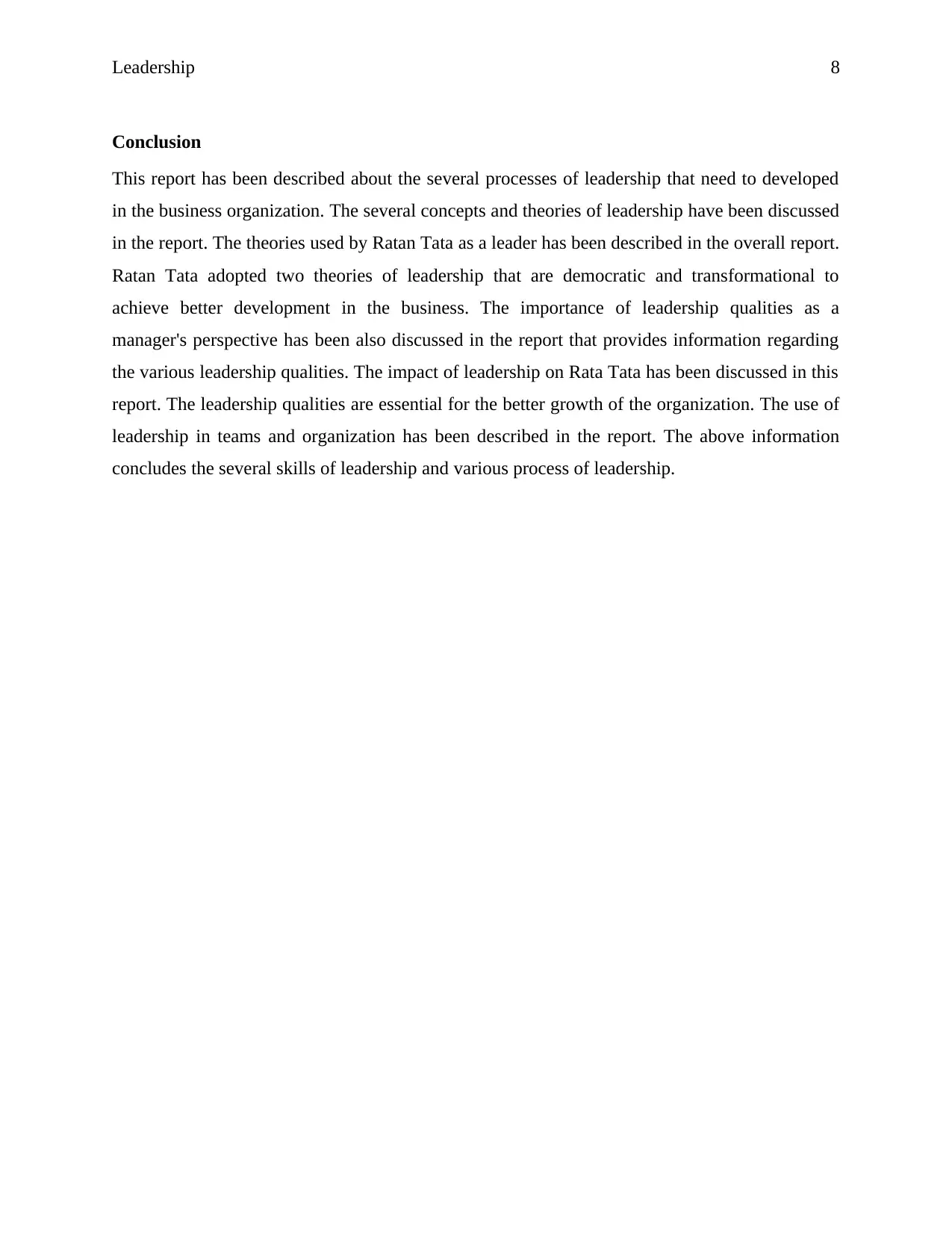
Leadership 8
Conclusion
This report has been described about the several processes of leadership that need to developed
in the business organization. The several concepts and theories of leadership have been discussed
in the report. The theories used by Ratan Tata as a leader has been described in the overall report.
Ratan Tata adopted two theories of leadership that are democratic and transformational to
achieve better development in the business. The importance of leadership qualities as a
manager's perspective has been also discussed in the report that provides information regarding
the various leadership qualities. The impact of leadership on Rata Tata has been discussed in this
report. The leadership qualities are essential for the better growth of the organization. The use of
leadership in teams and organization has been described in the report. The above information
concludes the several skills of leadership and various process of leadership.
Conclusion
This report has been described about the several processes of leadership that need to developed
in the business organization. The several concepts and theories of leadership have been discussed
in the report. The theories used by Ratan Tata as a leader has been described in the overall report.
Ratan Tata adopted two theories of leadership that are democratic and transformational to
achieve better development in the business. The importance of leadership qualities as a
manager's perspective has been also discussed in the report that provides information regarding
the various leadership qualities. The impact of leadership on Rata Tata has been discussed in this
report. The leadership qualities are essential for the better growth of the organization. The use of
leadership in teams and organization has been described in the report. The above information
concludes the several skills of leadership and various process of leadership.
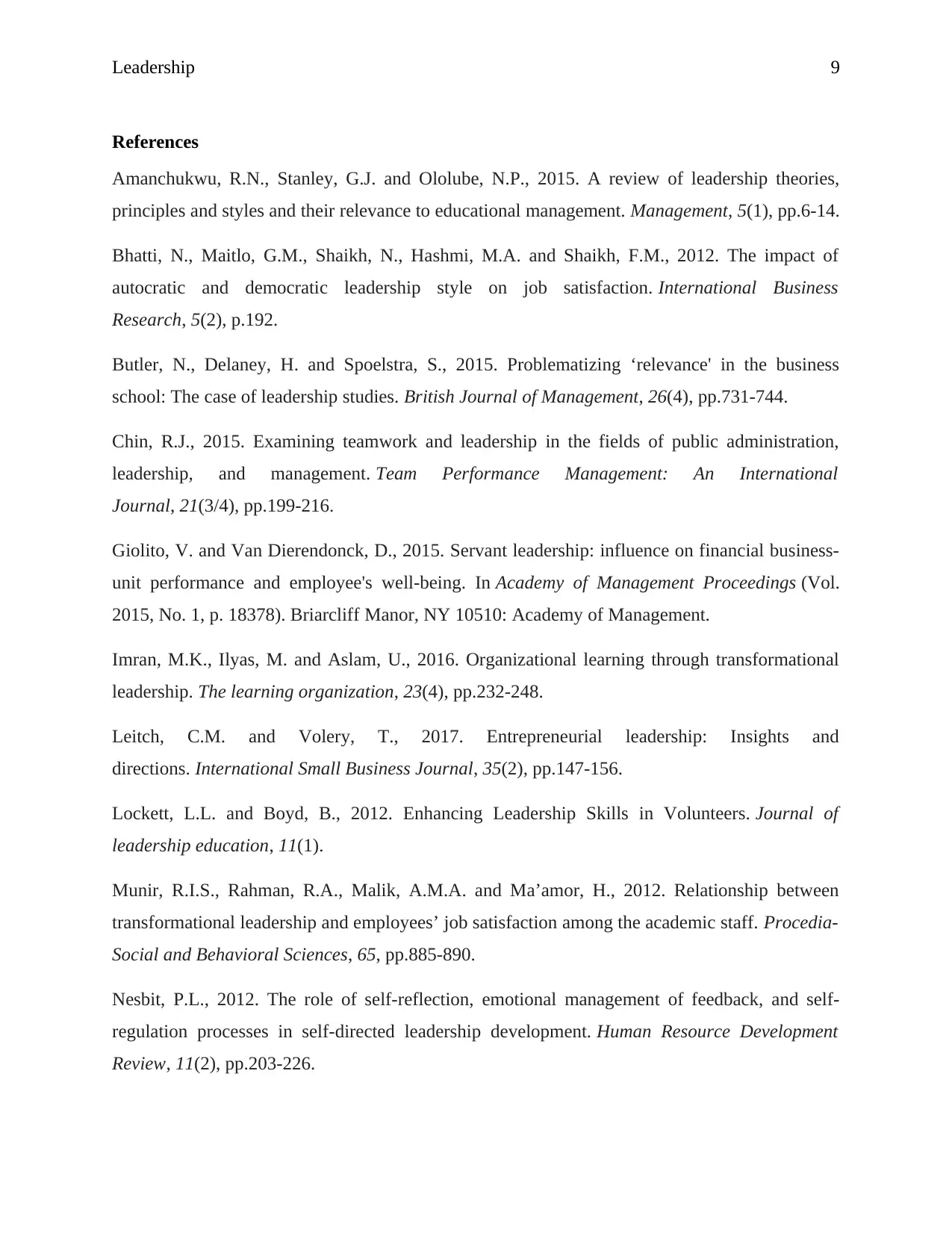
Leadership 9
References
Amanchukwu, R.N., Stanley, G.J. and Ololube, N.P., 2015. A review of leadership theories,
principles and styles and their relevance to educational management. Management, 5(1), pp.6-14.
Bhatti, N., Maitlo, G.M., Shaikh, N., Hashmi, M.A. and Shaikh, F.M., 2012. The impact of
autocratic and democratic leadership style on job satisfaction. International Business
Research, 5(2), p.192.
Butler, N., Delaney, H. and Spoelstra, S., 2015. Problematizing ‘relevance' in the business
school: The case of leadership studies. British Journal of Management, 26(4), pp.731-744.
Chin, R.J., 2015. Examining teamwork and leadership in the fields of public administration,
leadership, and management. Team Performance Management: An International
Journal, 21(3/4), pp.199-216.
Giolito, V. and Van Dierendonck, D., 2015. Servant leadership: influence on financial business-
unit performance and employee's well-being. In Academy of Management Proceedings (Vol.
2015, No. 1, p. 18378). Briarcliff Manor, NY 10510: Academy of Management.
Imran, M.K., Ilyas, M. and Aslam, U., 2016. Organizational learning through transformational
leadership. The learning organization, 23(4), pp.232-248.
Leitch, C.M. and Volery, T., 2017. Entrepreneurial leadership: Insights and
directions. International Small Business Journal, 35(2), pp.147-156.
Lockett, L.L. and Boyd, B., 2012. Enhancing Leadership Skills in Volunteers. Journal of
leadership education, 11(1).
Munir, R.I.S., Rahman, R.A., Malik, A.M.A. and Ma’amor, H., 2012. Relationship between
transformational leadership and employees’ job satisfaction among the academic staff. Procedia-
Social and Behavioral Sciences, 65, pp.885-890.
Nesbit, P.L., 2012. The role of self-reflection, emotional management of feedback, and self-
regulation processes in self-directed leadership development. Human Resource Development
Review, 11(2), pp.203-226.
References
Amanchukwu, R.N., Stanley, G.J. and Ololube, N.P., 2015. A review of leadership theories,
principles and styles and their relevance to educational management. Management, 5(1), pp.6-14.
Bhatti, N., Maitlo, G.M., Shaikh, N., Hashmi, M.A. and Shaikh, F.M., 2012. The impact of
autocratic and democratic leadership style on job satisfaction. International Business
Research, 5(2), p.192.
Butler, N., Delaney, H. and Spoelstra, S., 2015. Problematizing ‘relevance' in the business
school: The case of leadership studies. British Journal of Management, 26(4), pp.731-744.
Chin, R.J., 2015. Examining teamwork and leadership in the fields of public administration,
leadership, and management. Team Performance Management: An International
Journal, 21(3/4), pp.199-216.
Giolito, V. and Van Dierendonck, D., 2015. Servant leadership: influence on financial business-
unit performance and employee's well-being. In Academy of Management Proceedings (Vol.
2015, No. 1, p. 18378). Briarcliff Manor, NY 10510: Academy of Management.
Imran, M.K., Ilyas, M. and Aslam, U., 2016. Organizational learning through transformational
leadership. The learning organization, 23(4), pp.232-248.
Leitch, C.M. and Volery, T., 2017. Entrepreneurial leadership: Insights and
directions. International Small Business Journal, 35(2), pp.147-156.
Lockett, L.L. and Boyd, B., 2012. Enhancing Leadership Skills in Volunteers. Journal of
leadership education, 11(1).
Munir, R.I.S., Rahman, R.A., Malik, A.M.A. and Ma’amor, H., 2012. Relationship between
transformational leadership and employees’ job satisfaction among the academic staff. Procedia-
Social and Behavioral Sciences, 65, pp.885-890.
Nesbit, P.L., 2012. The role of self-reflection, emotional management of feedback, and self-
regulation processes in self-directed leadership development. Human Resource Development
Review, 11(2), pp.203-226.
⊘ This is a preview!⊘
Do you want full access?
Subscribe today to unlock all pages.

Trusted by 1+ million students worldwide
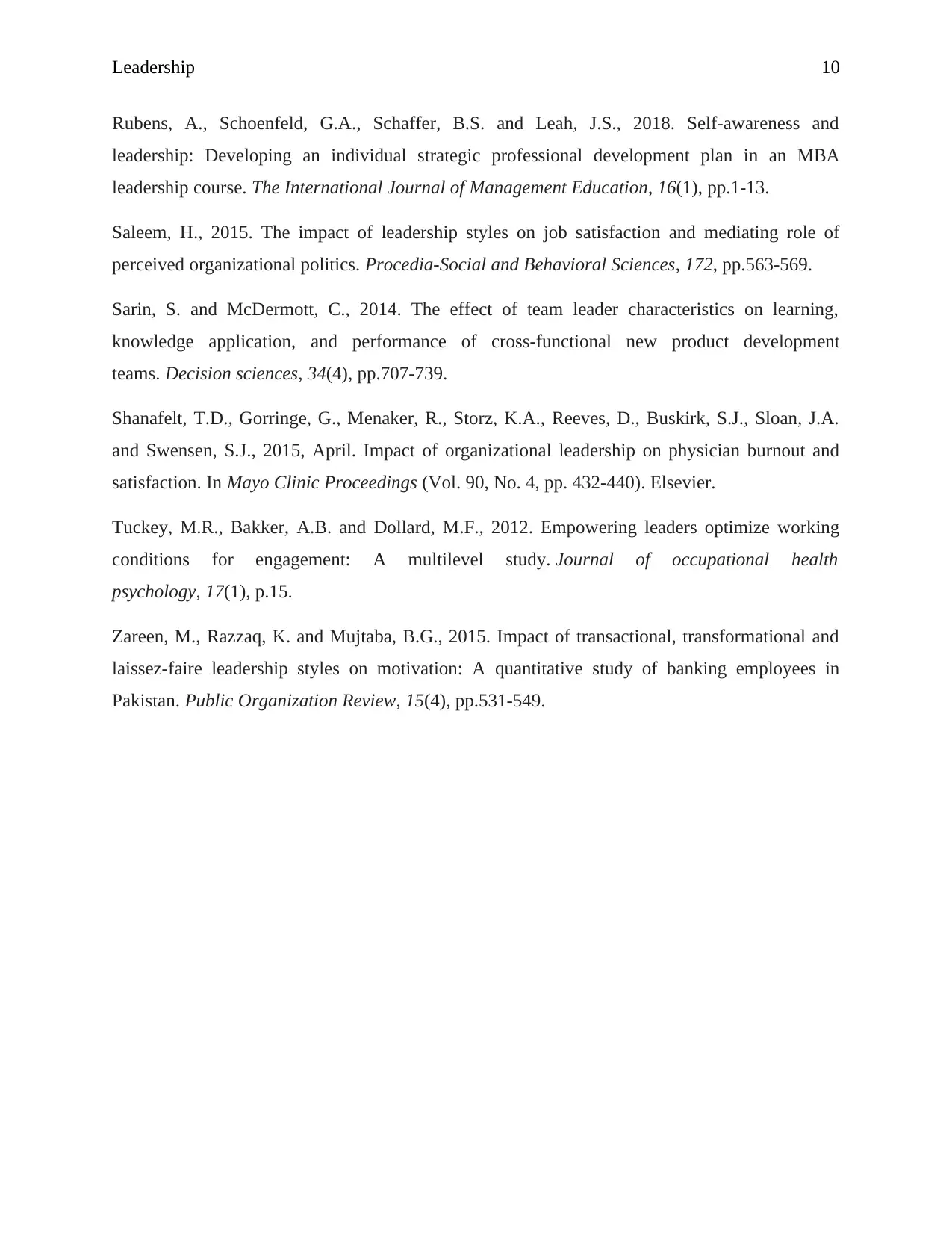
Leadership 10
Rubens, A., Schoenfeld, G.A., Schaffer, B.S. and Leah, J.S., 2018. Self-awareness and
leadership: Developing an individual strategic professional development plan in an MBA
leadership course. The International Journal of Management Education, 16(1), pp.1-13.
Saleem, H., 2015. The impact of leadership styles on job satisfaction and mediating role of
perceived organizational politics. Procedia-Social and Behavioral Sciences, 172, pp.563-569.
Sarin, S. and McDermott, C., 2014. The effect of team leader characteristics on learning,
knowledge application, and performance of cross‐functional new product development
teams. Decision sciences, 34(4), pp.707-739.
Shanafelt, T.D., Gorringe, G., Menaker, R., Storz, K.A., Reeves, D., Buskirk, S.J., Sloan, J.A.
and Swensen, S.J., 2015, April. Impact of organizational leadership on physician burnout and
satisfaction. In Mayo Clinic Proceedings (Vol. 90, No. 4, pp. 432-440). Elsevier.
Tuckey, M.R., Bakker, A.B. and Dollard, M.F., 2012. Empowering leaders optimize working
conditions for engagement: A multilevel study. Journal of occupational health
psychology, 17(1), p.15.
Zareen, M., Razzaq, K. and Mujtaba, B.G., 2015. Impact of transactional, transformational and
laissez-faire leadership styles on motivation: A quantitative study of banking employees in
Pakistan. Public Organization Review, 15(4), pp.531-549.
Rubens, A., Schoenfeld, G.A., Schaffer, B.S. and Leah, J.S., 2018. Self-awareness and
leadership: Developing an individual strategic professional development plan in an MBA
leadership course. The International Journal of Management Education, 16(1), pp.1-13.
Saleem, H., 2015. The impact of leadership styles on job satisfaction and mediating role of
perceived organizational politics. Procedia-Social and Behavioral Sciences, 172, pp.563-569.
Sarin, S. and McDermott, C., 2014. The effect of team leader characteristics on learning,
knowledge application, and performance of cross‐functional new product development
teams. Decision sciences, 34(4), pp.707-739.
Shanafelt, T.D., Gorringe, G., Menaker, R., Storz, K.A., Reeves, D., Buskirk, S.J., Sloan, J.A.
and Swensen, S.J., 2015, April. Impact of organizational leadership on physician burnout and
satisfaction. In Mayo Clinic Proceedings (Vol. 90, No. 4, pp. 432-440). Elsevier.
Tuckey, M.R., Bakker, A.B. and Dollard, M.F., 2012. Empowering leaders optimize working
conditions for engagement: A multilevel study. Journal of occupational health
psychology, 17(1), p.15.
Zareen, M., Razzaq, K. and Mujtaba, B.G., 2015. Impact of transactional, transformational and
laissez-faire leadership styles on motivation: A quantitative study of banking employees in
Pakistan. Public Organization Review, 15(4), pp.531-549.
1 out of 10
Related Documents
Your All-in-One AI-Powered Toolkit for Academic Success.
+13062052269
info@desklib.com
Available 24*7 on WhatsApp / Email
![[object Object]](/_next/static/media/star-bottom.7253800d.svg)
Unlock your academic potential
Copyright © 2020–2025 A2Z Services. All Rights Reserved. Developed and managed by ZUCOL.





